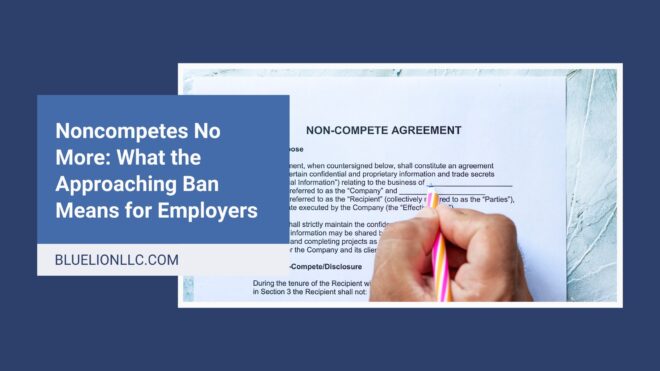
There’s been a lot of talk around noncompete agreements since the FTC announced its final rule to ban them nationwide on April 23, 2024. Although it’s not yet effective, this ruling could affect employers, workers, and the U.S. economy.
The commission noted that noncompetes negatively impact the economy and workers by keeping wages low and stifling new ideas and businesses. They are common and often take advantage of workers by forcing them to either keep a job they wish to leave or take on “other significant harms and costs” (e.g., lower pay, relocation, being out of work, or costly legal battles).
Through the new rule, the FTC aims to provide Americans “the freedom to pursue a new job, start a new business, or bring a new idea to market.” The commission estimates that the noncompete ban will result in:
- 2.7% increase in new businesses formed annually—that’s more than 8,500 additional new businesses a year!
- $524 more per year in earnings for the average worker
- An average of 17,000 to 29,000 more patents each year
Get the details of the FTC’s new rule, who it affects, and your responsibilities and options as an employer below.
A Breakdown of the FTC Ban on Noncompetes
Most workers’ existing noncompetes will no longer be enforceable after the rule’s effective date, which is currently set for September 4, 2024. There is an exception for existing noncompete agreements with senior executives earning over $151,164 annually and in policy-making positions. Employers can keep these existing agreements but may not form or enforce new noncompetes with senior executives.
The rule will be retroactive, and employers will need to notify any applicable workers that their noncompetes will not be enforced against them in the future.
What is a Noncompete Agreement Defined As?
The FTC kept the language of the ruling broad, only specifically banning noncompetes. The ruling bans any noncompete clause or agreement that “prohibits a worker from, penalizes a worker for, or functions to prevent a worker” from finding work or starting a business in the United States.
However, it also notes that other restrictive covenants, such as non-disclosure and non-solicitation agreements, are also illegal when they are written broadly for the same purpose as noncompetes (i.e., preventing a worker from obtaining a job or starting a business in the same field).
What are the Exceptions?
The noncompete ban doesn’t apply to banks, savings and loan institutions, federal credit unions, common carriers, air carriers, foreign air carriers, and individuals and businesses subject to the Packers and Stockyards Act. Nonprofits are another exception, as the FTC only has authority over for-profit businesses.
Are Noncompetes Currently Banned?
Not yet, the rule will not go into effect until September 4, 2024—120 days after it was published in the Federal Register. However, there have already been several lawsuits challenging the ruling, which has raised a significant question: Does the FTC have the authority to regulate noncompetes, which have historically been regulated by state law?
These challenges could extend the rule’s effective date or prevent it from ever going into effect at all. So, what should you do about noncompete agreements now?
Next Steps for Employers
If noncompetes are part of your new hire onboarding paperwork at all, you should stay tuned for updates regarding the rule. Employers have a few options for preparing for the potential noncompete ban.
- Operate as business per usual: Since the rule is not effective yet and the legal challenges are likely to draw it out, you can continue doing what you’re doing while keeping an eye on changes. Either way, all employers should use noncompetes, non-solicits, and non-disclosure agreements with caution, as many states are restricting their use.
- Implement changes today: Move forward as if the rule will go into effect on September 4, 2024, by updating employment agreement templates to remove noncompete clauses. Limit the use of nondisclosures and non-solicitations along with any other similar clauses or agreements that could inhibit workers from finding new jobs or starting a business. Prepare notices informing employees that their noncompetes will be unenforceable—you’ll want to send these before the effective date, but.
- Use an in-between solution: Continue using noncompetes with senior executives and other highly compensated employees. It’s possible the legal challenges will result in a modified version of the FTC ban on noncompetes that will treat workers of different levels accordingly.
Keep Up with the Latest on Noncompete Agreements
With the effective date approaching and several lawsuits pending, the final turnout is still unclear. We recommend that all employers monitor the progress of the noncompete ban and use these agreements sparingly. Since this is an evolving topic that will impact many of our clients, we will continue sharing updates here as well, so be sure to check back!
Do you have questions about noncompetes or other employment agreements? Contact BlueLion today at info@bluelionllc.com or 603-818-4131 for guidance!
The information on this website, including its newsletters, is not, nor is it intended to be legal advice. You should contact an attorney or HR specialist for advice on your individual situation.



